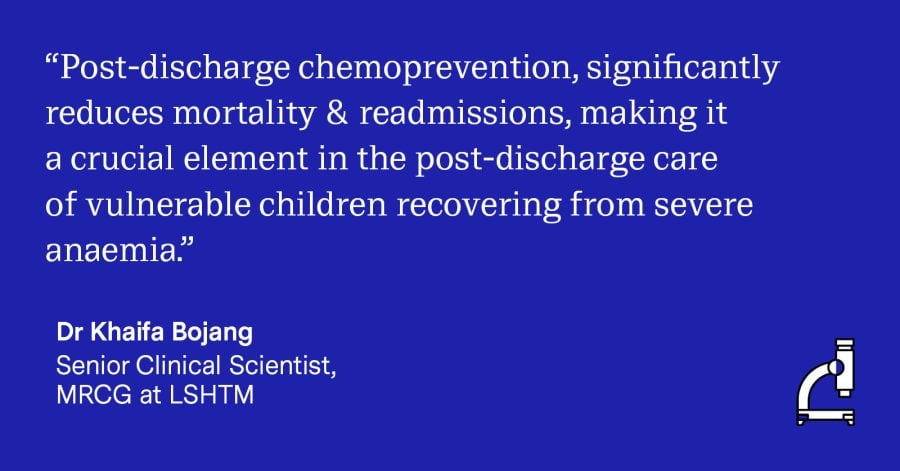Publication of the evidence supporting WHO’s recommendation of Post-Discharge Chemoprevention for Children Recovering from Severe Malaria Anaemia
18 January 2024 London School of Hygiene & Tropical Medicine London School of Hygiene & Tropical Medicine https://lshtm.ac.uk/themes/custom/lshtm/images/lshtm-logo-black.png
The decision, based on a comprehensive meta-analysis of three pivotal trials, highlights a 77% reduction in mortality and a 55% decrease in hospital readmissions during the intervention period.
The strategy involves providing monthly chemoprevention, including antimalarials like sulphadoxine pyrimethamine, artemether lumefantrine, and dihydro-artemisinin-piperaquine, during the malaria transmission season immediately following a child's discharge from the hospital.
Dr. Kalifa Bojang, who led the innovative study in The Gambia, emphasized the impact of post-discharge chemoprevention, stating that it significantly reduces mortality and readmissions, making it a crucial element in the post-discharge care of vulnerable children recovering from severe anaemia.
The recent analysis, supported by renowned malaria researcher Prof Brian Greenwood, reinforces the urgency of implementing this life-saving policy. Greenwood notes that the challenge now lies in ensuring widespread adoption of this intervention and determining the optimal duration of protection for these vulnerable children.
Umberto D’Alessandro, Director of the MRC Unit The Gambia and Professor of Epidemiology at LSHTM, contextualizes post-discharge chemoprevention within the spectrum of treatment-based preventive interventions recommended by WHO. He underscores the vulnerability of children returning home after severe malaria anaemia hospitalization, highlighting the risk of reinfection and subsequent severe anaemia. D’Alessandro emphasizes the need to scale up this intervention and explores the potential integration of other preventive measures, such as insecticide-treated bed nets, malaria vaccines, and even monoclonal antibodies for sustained protection.
The 3 double-blind, placebo-controlled trials, funded by the Research-Council of Norway and the Bill-&-Melinda-Gates-Foundation through the Worldwide-Antimalarial-Research-Network, included 3663 children with severe anaemia from The Gambia, Malawi, Kenya and Uganda.
As the global health community embraces this new WHO recommendation, attention turns to the critical task of implementing post-discharge chemoprevention effectively and exploring innovative solutions for extended protection, potentially involving emerging antimalarial monoclonal antibodies that offer up to six months of safeguarding from malaria with a single treatment.
The collaborative efforts of researchers, policymakers, and healthcare providers are now crucial in translating this breakthrough into tangible improvements in the post-hospitalization care of young African children recovering from severe malaria anaemia.
Phiri, KS; Khairallah, C; Kwambai, TK; BOJANG, K; Dhabangi, A; Opoka, R; Idro, R; Stepniewska, K; Van Hensbroek, MB; John, CC; Robberstad, B; GREENWOOD, B; Kuile, FO T; The Lancet. Global health, 2024
If you enjoyed this article and would like to build a career in global health, we offer a range of MSc programmes covering health and data, infectious and tropical diseases, population health, and public health and policy.
Available on campus or online, including flexible study that works around your work and home life, be part of a global community at the UK's no.1 public health university.